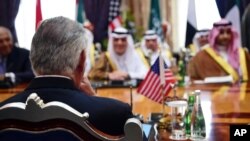Arab media accused Qatar this week of helping to transport Islamic State militants from Syria and Iraq to the south of Libya.
The allegations were the latest in a series made against the Gulf emirate by a coalition of countries including Saudi Arabia, Egypt, Bahrain and the United Arab Emirates. The coalition imposed sanctions against Doha in June for allegedly supporting terrorists.
Following the accusations, the emirate's relations with some of Libya's neighbors deteriorated. In late August, Chad shut down the Qatari embassy in N'Djamena after accusing Qatar of using its soil to destabilize nations in the Lake Chad basin and the Sahel.
Chad's foreign minister, Ibrahim Hussein Taha, accused Qatar of supporting opponents of his government, saying it supported and sponsored Chadian groups opposed to the government, both in Libya and in Qatar.
Earlier this month, a military spokesman for the Libyan National Army, under the command of General Khalifa Hafter, told Arab media that Qatari support for IS terrorists, especially financial support, had not stopped.
He accused Doha of committing other crimes against the Libyan people, including transporting Islamic State militants from Syria and Iraq to Sudan and then on to Libya.
Former U.S. Defense Secretary and CIA Director Leon Panetta also said this week at a conference organized by the Hudson Institute that Qatar has a history of supporting terrorism:
"Qatar, frankly, has had a mixed record," he said. "We know they've provided support — financial support — for the Muslim Brotherhood, for terrorism, for Hamas, for elements of al-Qaida, the Taliban."
Christopher Davidson, who teaches Middle East politics at Durham University in Durham, England, argued that Qatar was involved in the transport of weapons and fighters from Libya to Syria in 2012 and 2013. Now, he said, it is involved in the reverse flow as IS falls apart in Syria and Iraq.
"Its usefulness has significantly declined in that theater of operations, and the weapons and presumably the men — at least the foreign fighters — are being moved to where they're needed most," he said. "And I believe that one of those locations at the moment is the Libyan conflict."
The shift, he said, is in part a result of a number of regional powers vying for supremacy in Libya, with Qatar on one side and the United Arab Emirates and Egypt on the other.
Gulf analyst Theodore Karasik in Washington was more nuanced, saying the accusations against Qatar "are a mixed bag."
"When you talk to folks in the region about Qatar's activity, it is a mixed view," he said. "It is the view that Qatar was involved and has pulled back, and the other one is that Qatar is using Turkey as its partner to continue to be involved in Libya."
Based on rumor
Karasik said many of the accusations were based on rumor, but that it appeared Doha was continuing its support for militants and that other players such as Sudan and Turkey were involved behind the scenes.
Egyptian editor and publisher Hisham Kassem questioned whether Qatar was directly transporting IS militants to Libya.
"It could be true, or maybe not," he said. "However, I don't think that Qatar would be able to transport terrorists ... from one location to the other and get past all the world's intelligence services. And if they were to do that and get caught red-handed, they would be in a very difficult situation now with countries like the [U.S.] or Europe."
Kassem noted that Qatar has often played the role of go-between for Western states and various terrorist groups, such as the Taliban. He pointed out that many such groups have representatives in Doha.
"Qatar," he said, "has what you call 'five-star hotel diplomacy.' They practically have a representative or more from every political or terrorist or whatever faction in Qatar and are just able to communicate with them to make them [be] useful."
He went on to stress that Qatar was not alone in supporting certain terrorist groups. He said he thought other Gulf states had also resorted to terrorism on various occasions in the past as well.





